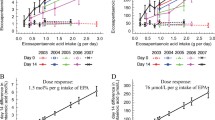Summary
In order to investigate the effect of a short-term application of marine n-3 polyunsaturated fatty acids on the composition of serum very low density lipoproteins (VLDL), low density lipoproteins (LDL), and high density lipoproteins (HDL), nine women aged 29±4.2 years, following a diet with a SFA/MUFA/PUFA profile of 2.4/3/1, received supplements of six capsules daily, each capsule containing 0.137 g of n-3 fatty acids (14.5% eicosapentaenoic acid (EPA) and 8.9% docosahexaenoic acid (DHA)) for 10 d. Food consumption, assessed during two 10-days periods indicates that percentage contribution of SFA, MUFA, and PUFA to the daily energy intake did not change through the fish-oil supplementation period, but the daily consumption of n-3 fatty acids increased 2.3 times. N-3 fatty supplementation increased EPA and DHA percentages in serum phospholipids, but failed to decrease (p>0.05) the cholesterol and triglyceride concentration in serum LDL and HDL, although it did so in VLDL. In contrast, the lipoprotein-phospholipid and lipoprotein-protein concentrations were markedly affected, mainly in LDL and HDL (at least p<0.01). HDL and VLDL compositions were not affected but the total mass (lipid+protein in mg/dl) concentration of these lipoproteins significantly decreased (p<0.05), suggesting a lower number of these particles in circulating blood after the n-3 treatment. The LDL-cholesterol/LDL-apolipoprotein B ratio increased (p<0.01) reflecting a probable increase in LDL size. Following fish oil supplementation, LDL particles contained a significantly lower amount of phospholipids, which also suggests changes in the surface/core ratio of the average LDL. Changes in serum lipoprotein lipids did not significantly correlate with any dietary change other than the n-3 fatty acid increase. The results indicate that a 10-day application of a small supplement of n-3 change the LDL composition leading to less atherogenic LDL particles with lower phospholipid and apolipoprotein (Apo) B concentrations.
Similar content being viewed by others
Author information
Authors and Affiliations
Additional information
Received: 15 May 1998, Accepted: 28 August 1998
Rights and permissions
About this article
Cite this article
Sanchez-Muniz, F., Bastida, S., Viejo, J. et al. Small supplements of N-3 fatty acids change serum low density lipoprotein composition by decreasing phospholipid and apolipoprotein B concentrations in young adult women. Eur J Nutr 38, 20–27 (1999). https://doi.org/10.1007/s003940050042
Issue Date:
DOI: https://doi.org/10.1007/s003940050042




